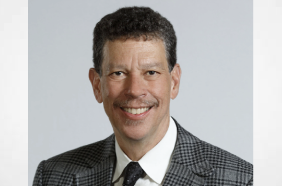Last June, an attorney filed a legal brief he had written with the help of the generative AI platform, ChatGPT. The document included citations to a series of legal cases that seemingly offered precedents that supported his client’s position. There was only one problem. As the judge in the case discovered, six of those cases didn’t exist. Instead, they’d been dreamed up by the online tool. This was only one of several high-profile incidents in which new technology has stymied — and sometimes embarrassed — the lawyers using it (just Google “I am not a cat.”). Yet, many legal experts believe generative AI will also change the legal profession in ways that will aid lawyers and their clients.
To learn more about how AI is expected to transform the legal profession, as well as other important industry trends in the year ahead, Harvard Law Today recently spoke with Professor David Wilkins ’80, director of the Center on the Legal Profession at Harvard Law School. In the first installation of a two-part interview, Wilkins briefly summarizes legal industry trends he will be following this year and outlines both the opportunities and challenges AI will likely present. In part two, Wilkins will discuss a range of other questions, from lawyering in an election year, to salary trends, to the changing work and priorities of general counsels, and what they mean for the future of legal education.
Harvard Law Today: What do you see as some of the biggest trends in the legal profession this year?
David Wilkins: This has really been a very eventful year for the legal profession, with many important changes and potential disruptions, all of which are interrelated. Let me touch briefly on a few. Leading the list, of course, is artificial intelligence. Every other conversation I have is about ChatGPT and how it will impact the practice of law. Those conversations often lead quickly to talking about legal careers and AI’s potential employment effects. The IMF has said that 40% of all jobs in the world could be affected by AI and that it’s mostly going to be felt in the white collar and professional ranks. That clearly has implications for lawyers.
Another important trend is that, according to 2024 NALP data, the majority of associates at law firms are now women, which has led to a whole series of questions about how diversity will be treated in the legal profession moving forward, particularly in light of the fact that a majority of minority law students are female.
There are also discussions around the role of the legal profession in a time of global unrest. For example, what will be the effects of rising geopolitical tensions — the war in Ukraine, the conflict in the Middle East, competition with China — on markets? Two years ago, ESG [environmental, social, and corporate governance] was the global zeitgeist. And while it is still a powerful organizing force in Europe, it has become a highly contentious issue here in the United States. And, of course, we are entering an election year here in the United States. Lawyers are going to have critical roles to play in helping America and the world protect democracy in a time of increasing polarization and conflict.
Read more at




